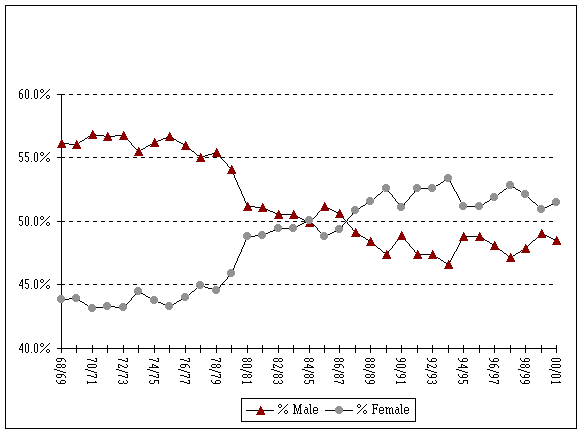Essentially, the book describes how the women's rights movement has made it so that schools teach girl friendly curriculum. Before I go any further, let me just say that I have no problem with women's rights activists. Being a minority myself, I understand their struggle to get fair and equal education in school for their daughters.
Now that I'm through with that little sidebar, I will continue. I'm sure that all of my readers have seen the graphs detailing how girls are enrolling
 more in college than boys. If not, here is a graph detailing this trend.
more in college than boys. If not, here is a graph detailing this trend.Please, feminists, hold up your attacks for a minute. Some of you out there must have sons in school and this must worry you at least a little bit. If it doesn't, then you're horrible f*cking parents and don't deserve to have little boys under your command. For those of you who are worried, you are worried with good cause, and you're not the only ones. Ms. Tyre is worried with you.
The main question of the book is, "How can we fix this problem without upsetting all of the feminists who worked so hard to get our dauthers equality in schools, who worked so hard to make sure that more than 50% of girls enrolled in college?"
The answer is not so simple. The book first of all points out that boys and girls learn differently. OK, we can live with that. Boys are usually more active and enjoy and get more out of hands-on learning. Girls, however, learn more with book-learning, and are less active. The book says that even if girls are bored with a particular lesson, they are more likely than a boy to just sit there and force themselves to absorb it. This is true.
And Ms. Tyre believes that schools send a negative message to boys about reading. "Boys predominantly choose books that are funny and vulgar. They think The Adventures of Captain Underpants is the funniest thing on earth. They don't want to read Little House on the Prairie! But if they bring Captain Underpants or Captain Marvel to school, many teachers will tell them those aren't classroom books. So they learn that what they like to read isn't acceptable at school. That's a negative message that sets a lot of boys back.The same goes for writing. Boys tend to write for other boys—things that are dark, funny, and gory—whereas girls tend to write for the teacher. Boys don't want to write personal narratives; they want to write about Star Wars, and teachers might not approve of that, so we're creating nonreaders and nonwriters."
About early education she says, "Over the last 10 years, parents have bought into this idea that children are receptive to academic learning at a very young age. But there's good research that says that's really bad for a lot of boys, who aren't developmentally ready yet—their fine motor skills and vocabulary develop later than girls', and they have a harder time sitting still. We think if we give them French and violin lessons early, we can plant the seeds of genius. But it doesn't work that way."
Now, can we change this uneven academic playing field, which, for the first time in hundreds of years, is slanted in the favor of girls? To quote Barack Obama, "Yes we can."
But how should we approach this problem without disenfranchising the millions of girls who have had their mothers, grandmothers, sisters, aunts, cousins and sometimes male relatives, work so hard to get them to this spot? First of all, the book says that we can instill a love of learning in boys just by hiring male teachers, or having male role models come into school and show the boys the value of education. This doesn't hurt girls, and it will get boys to see education as a valuable tool to become a police officer or a fire fighter or whatever.
If this should fail, then Ms. Tyre also advocates single sex schools. She tells the story of an all boys school in New York, which, among other problems, had a crew of feminists attacking it for being sexually discriminatory. The school was assaulted with discrimination lawsuits and shut down within five years.
She then tells the story of an all-girls school where the principal, an ardent feminist, sued the City of New York and got a verdict that allowed the school to remain open as long as the facilities remained equal. This prompted a New York branch of the 100 Black Men organization to open an all boys school of their own. The boys at this school are well dressed, well spoken and getting a college preparatory education. However, these boys have problems that carry over from their elementary and middle schools. Many of them are averse to learning, believing that being educated is a sign of weakness. Due to this belief, many of them are below grade level in reading, but the organization will not give up on this school.
So, what shall we do, then? What is the proper course of action to make sure that our sons can go to college so that they will have a fighting chance in the corporate world? What steps can we take to ensure that our daughters do not fall behind in this mad rush to narrow the gender gap?
Because the last thing we need is to hinder the progress of our daughters to bring it to an equal level with our sons and call it "success."
